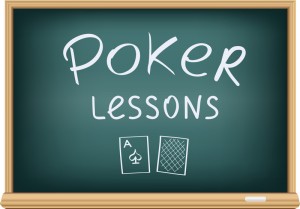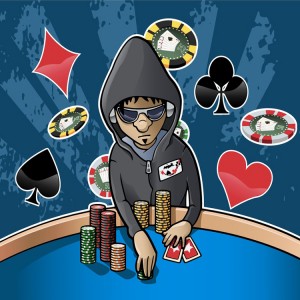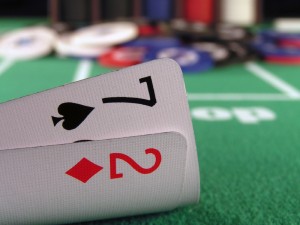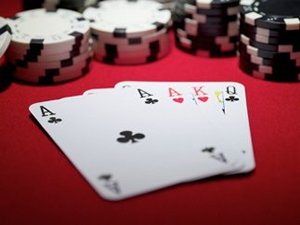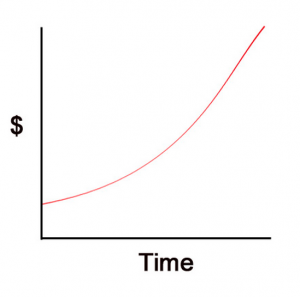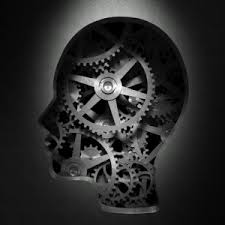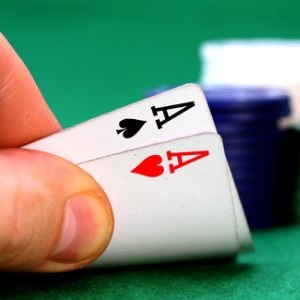 You are dealt Ac Kc in early position and you raise your premium holding. Three players cold-call your raise, as do both the blinds.
You are dealt Ac Kc in early position and you raise your premium holding. Three players cold-call your raise, as do both the blinds.
The flop is a nice looking Kh 6s 4s. You bet and all five opponents call.
The turn is 9c. You bet and three of your five opponents call.
The river is Qd. You bet and get raised. You make a crying call and are shown Jd Ts for the straight.
I think this story will resonate with most poker players, especially those who play (or have played) in the lower limits. Most winning poker players realise that they need to play against inferior players to win. However, sometimes it seems like your opponents are so bad that they actually become more difficult to beat. So many players are staying around with so many random hands, that one of them are bound to hit a hand better than yours.
And so the theory of schooling was born. A school is a collective noun for a group of fish. Likewise, at the poker table, schooling is a word used to describe the behaviour of a group of fish a the poker table, fish in this context referring to poor players. The theory is that bad poker players can collectively protect each other. Beyond a certain point, additional bad players might actually decrease your expectation, making the game harder to beat than one with only a few bad players. The ideas behind this are as follows:
1. While each of your opponents may have only a few outs, collectively they have a lot. For example, imagine you have top pair on the flop and you have one opponent with a gutshot, one with an underpair, one with an overcard and one with a backdoor flush draw. Between them they may have in the region of 11 outs and will overtake you (collectively) by the river around 50% of the time if they all call down, even though all their draws are individually weak. Add in a couple of players with legitimate draws and suddenly you are dodging an insane number of bullets.
2. The more players that are in a hand, the better the hand that is likely needed to win. The hands that we traditionally consider as ‘good’ are those that make good one pair hands. When a better hand (such as two pair, a set, a straight or a flush) is needed to win, the edge that ‘better’ hands have over trash is smaller than when one pair is likely to be good. 22 is just as likely to make a set as AA. 83s is just as likely to make a flush as AQs. Any two random cards can hit two pair.
3. Each player that stays in the hand gives every other player better pot odds to hit their draw. For example, a bad call with a gutshot on the flop might retrospectively become a good call once three more players call adding three more bets to the pot. All the bad players are effectively validating each other’s play.
Given this moderately logical reasoning, it is not hard to see why a lot of players buy into the idea of schooling. You can also see why a lot of players might want to believe in it. Every low limit player has played in one of those sessions where their opponents have played terribly, but they have been crushed as these opponents hit hand after hand. Rather than put it down to acceptable variance or admit that they didn’t adjust properly, they can just blame schooling. Players like to have someone to blame for their failures. The theory of schooling allows them to place the blame exactly where they want to – at the feet of their weak opponents.
“It’s impossible to beat a game like this, you idiots are just too terrible” – A. Nit
In this two-part article, we will be discussing concept of schooling. The opinion on it is split, with some players considering it accepted poker theory, while others consider it rubbish. Hopefully by the end of this article we can answer the question of whether schooling really is a valid concept or not. We will do this first by discussing the theoretical concepts behind schooling and then, in next months article, exploring the topic empirically by attempting to model schooling situations.
Schooling and the Theory of Poker
A good place to start (as it so often is) is with Sklansky’s Theory of Poker. Boiled down to its bare essentials:
Whenever an opponent makes a mistake, you make money.
Whenever an opponent makes a correct play, you lose money.
So how does schooling fit into this theory? Well, it doesn’t really. Schooling would suggest that if too many players make mistakes then a good player would actually lose money as a result. This doesn’t sit well with the Theory of Poker at all. By definition, a mistake in poker is something that costs you money (in the long term), so where is that money going? Poker is a zero-sum game so every mistake that costs one player money must benefit another (there may also be an increase in the rake, but this will be negligible).
Hence at first glance it would seem that the Theory of Poker makes a mockery of schooling, but this is not quite the case. Remember the three arguments in favour of schooling that we identified above? The third of these is that when many players are calling with weak draws, these draws actually become less weak. This actually fits in quite nicely with the Theory of Poker, because Sklansky is careful to carve out an exception for multi-way pots. In a heads up pot, when your opponent makes a mistake, you make money. In a multi-way pot, when an opponent makes a mistake then somebody makes money, but it might not necessarily be you.
For example, let’s say that you have the best hand on the flop and bet. Players A, B and C all make bad calls and the action comes to Player D. Player D also makes a bad call, but the dead money adds only to the equity of Players A, B and C and not to yours. Player D might carve his small slice of the pie directly from your slice and this might more than compensate for the fact that the pie is now bigger. Thus his bad call may in fact cost you money, in theory at least.
So in fact, schooling is not disproved by the Theory of Poker; both theories can sit side by side. Unfortunately, it doesn’t really prove it either. In certain circumstances additional weak players in the pot can cost you money, but the question that really matters is how often will this happen in practice? Or to look at it another way, do a large number of bad players cost you money in general or just in certain individual hands? We will have to dig a little deeper if we really want to find out.
Unfortunately it is not a question that is easy to answer. In next months article we will be modelling some situations that may help to answer the question. However, this is never going to be entirely accurate because the hands that you simulate will obviously be cherry picked. The other way to answer the question is to argue it from a common sense point of view. At the beginning of the article we looked at the arguments in favour of schooling, so here is the other side of the argument, the arguments against the existence of schooling.
Variance
When you are in a game with a large number of loose players, two things happen. The pots get larger on average (especially if they are loose aggressive players) and your chances of winning each pot that you enter go down somewhat. Combined, these two variables cause your variance (the swings you experience) to increase by a considerable amount. Sometimes you will win a lot of money, while other times you will get crushed by strings of bad beats.
The problem is that players who frequent these types of games misunderstand this variance. When they have a great session, they will feel they deserved it. After all they were playing better hands than their opponents, so they deserved to win the hands that they did. On the other hand, when they have a bad session, they will blame schooling. It seemed no matter how good their hand was going in, one of their many opponents would suck out on them. If they have a string of these sessions (which will happen from time to time) they might conclude that it is impossible to beat this type of game.
Of course, both the good sessions and the bad sessions were two sides of the same coin. In the good sessions, they underestimated how much of their success was down to luck (it never seems like luck when you are winning). On the other hand, during the bad sessions they seemed to be getting more bad luck than should be possible. They get beat up so bad that they forget about the good sessions that came before. Schooling is a convenient explanation that helps to make sense of the volatile results, so players like to cite it whether or not it is actually correct.
Very bad calls
Schooling is based upon the idea that players make bad calls that are validated by all the other bad calls that are being made. However, this only works if the calls were not that bad in the first place. For example, calling the flop or even the turn with a gutshot straight draw is rarely a huge mistake in loose games, because generally speaking the pot will be quite large and you will have four strong outs. If you get called by four opponents who each have four strong outs each then it is indeed quite possible to get schooled.
However, if you have five or six players calling the flop every hand, then you can pretty much guarantee that they are calling with hands with far less than four outs. They are probably calling with weak overcards, backdoor straight and flush draws, under-pairs and all kinds of other garbage. Or maybe they are hands that look reasonable, but are actually dominated. These very bad calls are not hands that are going to school you. You want these hands to call no matter how many other players are in the pot because their pot equity is so small. Their presence might cost you the pot one time in twenty, but the dead money they contribute to the pot more than makes up for this.
Big hands and big draws
The great thing about having lots of loose opponents is that they won’t only be around when you have a vulnerable top pair, but they will also be around when you have a hand where you want a lot of opponents. This is the case when you either have a strong draw that benefits from multi-way action or when you have a hand so good that you want as many callers as possible because most are likely drawing dead or very slim.
The great thing about these situations is that your extra opponents are giving you a huge increase in expectation. Not the tiny fractions of big bets that schooling might shave off your pot equity, but the multiple big bets that clueless, loose players are willing to pay chasing a pair when you already have a set. When you win a 25 big bet pot with a flopped set or a flopped nut-flush draw that gets there, you start to see what a boon these loose callers actually are.
Poor adjustment
A lot of intermediate players suffer in low limit games, not so much because of schooling but because they don’t make the adjustments necessary to beat these games. From their point of view, they are playing all the right hands and making the right plays, but are getting beaten by trash time and time again. Once again, schooling gets the blame.
However, what is actually happening is that they don’t realise that you can’t just take your game that might work quite nicely in a reasonably tight, mid-limit game, play it in a loose game and expect it to work. Amongst other things, you need to take into account that:
– Pots are larger
– Implied odds are greater
– Weak outs must be discounted more
– Bigger hands are often needed to win
– Bluffing is ineffective
– Strong drawing hands are more valuable
– Top pair is very vulnerable
If you have AK and see a flop of K98 against 6 opponents, then you are going to lose a lot of the time. You can expect to lose. Even if your opponents hold completely random hands, your pot equity is under 40%. That’s not schooling, that’s just poker. Take some solace in the fact that the times your top pair does hold up, or you improve, the pot will be very large.
In Summary
In this article we have learned that schooling is a valid concept in theory. In practice it is not something that is likely to be an issue, even in very loose games. If you play very loose, low-limit games and feel you are being ‘schooled’ then it is far more likely that you are playing sub-optimally or are just going through a downswing right now. One thing you can be sure of is that playing limit hold’em in extremely loose games is highly profitable. Next month we will continue our discussion of schooling, modelling several poker situations to see if we can determine its effect on your results.
Until then, good luck at the tables.
Ian Taylor, AKA “Piemaster is the Co-Author of the highly regarded Poker Psychology Book “The Poker Mindset”.
Submit your review | |

